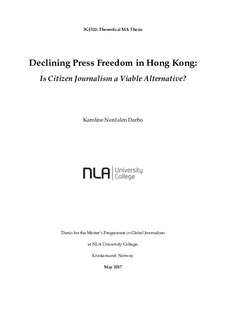| dc.description.abstract | The year 2014 was described as the darkest time for press freedom in Hong Kong in several decades. Since then, the Special Administrative Region has fallen yet another thirteen rankings at the World Press Freedom Index of Reporters Without Borders. With the reports of growing self-censorship among Hong Kong journalists, and a rise of alternative journalism formats, this thesis seeks to find out whether citizen journalism is a viable alternative to traditional journalism when press freedom is declining. Twelve qualitative interviews with citizen journalists and traditional journalists were conducted to find out more about the press freedom situation in Hong Kong, what the journalists see as the difference between a traditional journalist and a citizen journalist, and the attitudes towards citizen journalism. The findings show that the traditional journalists are negative about the future of press freedom in Hong Kong, perceiving a high degree of political and economic pressure. They also describe a situation where colleagues self-censor to meet the expectations from advertisers and media owners. This may lead to less trust among the audiences. Concerns about declining trust is strong among the journalists. Neither of the informant groups trusts the media to be neutral or that they are not supporting ‘Beijing’. At the same time, traditional journalists do not trust citizen journalism to be a sufficient alternative to traditional journalism. One of the concerns described by the traditional journalists is lack of a validity process and lack of neutrality in the reporting done by citizen journalists. However, citizen journalists in Hong Kong are often organized in one way or another, and four out of five citizen journalists in this thesis explain that they have an editor proofreading their work before publishing. This means that even if the traditional journalists are skeptical to the new group of journalists, they may not be as different as they might think. Typically, the traditional journalists explain that the citizen journalists produce independent news with new angles. By this they mean that while the traditional press can be censored, the Internet, which is the primary publication channel for citizen journalists, is not. | nb_NO |
